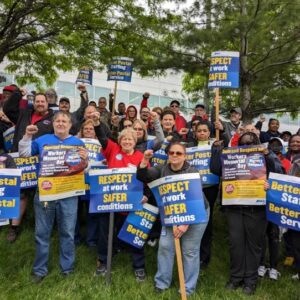September 8, 2025
Information Technology/Accounting Service Telework Negotiations
(This article appeared in the September/October 2025 issue of The American Postal Worker magazine)
On July 25, the APWU and USPS came to agreements on extending our Telework Pilot Program Memorandum of Understandings (MOUs) for the Accounting Service Centers (ASC) and Information Technology (IT). This was the third round of negotiations to extend the Telework Pilot MOUs since their inception in 2022, and undoubtedly the most difficult. Management’s proposals from early on were much more regressive than in previous years, but through dedication and solidarity in our membership, we were able to prevent the most harmful intentions of management.
Before negotiations about telework began, we anticipated that this round of negotiations would be different than the past extensions. On January 20 the White House issued the “Return to In-Person Work” Executive Order mandating that all departments and agencies of the executive branch “take all necessary steps to terminate remote work arrangements and require employees to return to work in-person…” On Feb. 4, Postal management announced they were rescinding their teleworking policy for non-bargaining and Postal Career Executive Service (PCES) employees and going through a telework phase down for those groups that would only allow one day of telework per week. While neither of these decisions had direct impact on our IT/ AS bargaining unit, the trend away from telework in the executive branch and in the non-bargaining sector had the potential to set management’s tone for our negotiations. Our assessment of management’s tone was correct. In our opening ASC telework negotiations meeting on April 8, management proposed to end the telework pilot completely and have all of ASC bargaining unit employees return to in-office work full-time. Although we had anticipated management proposing changes, we were shocked that they proposed to end the program completely. In contrast, the union’s proposal was to end the pilot phase and to codify the MOU into the Collective Bargaining Agreement.
We met with management on June 3 to discuss the IT Telework MOU. The IT sector has three separate management groups: Network Infrastructure Technology (NIT), Technology Applications, and Endpoint Technology. All three groups proposed changes that were negative in the MOU for the bargaining unit. Technology Applications management proposed to limit Flex time to 30 minutes, the Endpoint Technology management proposed to end Flex time, and NIT management proposed to end telework for the Production Operations Branch (POB). Again, in contrast, the union’s proposal was to codify the MOU into the Collective Bargaining Agreement and add at least one day of telework for the Facility Communications Technicians who have not been able to telework since the COVID Telework MOU ended in 2022.
With the changes proposed by management, the union organized two meetings to discuss what was presented to the bargaining unit. Our fight to preserve telework required a direct-action approach as much as it required us to negotiate at the table. In each of our meetings, there were almost 150 concerned bargaining unit members in attendance to ask questions and offer their ideas on how we should progress forward, Union democracy in action. With overwhelming support, our direct-action decision was a petition that explained the benefits of telework for the bargaining unit and management that would be delivered to key management officials.
Nearly 400 bargaining unit members signed our “Petition to Defend Telework Against IT/IS Management’s Proposed Changes.” The comments on the petition ranged from those who agreed that telework was a benefit for the bargaining unit and management, to those who would consider leaving their postal jobs if the changes were too drastic.
Although we could not deliver the petition directly to local management officials to show our frustration, the sentiment of the petition was expressed in negotiations. The result was that we were able to resist their most regressive changes. This is our union in action! ■



